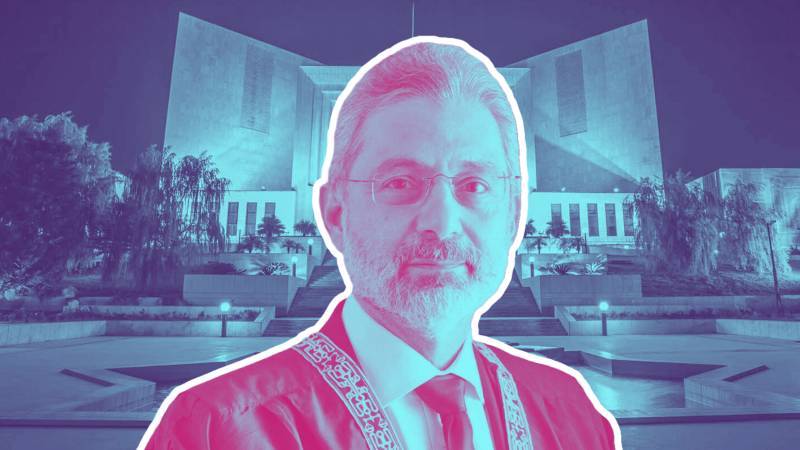
Chief Justice Qazi Faez Isa has defended the decisions taken by the Supreme Court under his charge, including the decision to hold general elections in 2024 and withdraw the electoral symbol from a major political party just days before the polls.
He also stated that the top court has acknowledged past mistakes and taken steps to address them.
CJP Isa expressed this in a letter to the Jane Marriot, the British High Commissioner deputed in Pakistan with copies of the letters dispatched to UK Supreme Court's President Lord Robert John Reed and England and Wales Lady Chief Justice Baroness Sue Lascelles Carr.
The letter, dated May 3 but did not become public until Wednesday, came in response to Marriott's speech at the Asma Jehangir Conference held late last month in Lahore.
Responding to certain issues raised by Marriott regarding democracy, elections, and the need for open societies, CJP Isa defended decisions taken by the top court, including on the general elections.
"Elections in Pakistan were required to be held within 90 days of the completion of the tenure of the National and provincial assemblies but had not taken place because the President and the Election Commission of Pakistan were at odds regarding who is empowered to announce the election date," CJP Isa explained, adding that the Supreme Court helped resolve the matter in just 12 days and general elections were held throughout Pakistan on February 8, 2024.
Regarding denying the Pakistan Tehreek-i-Insaf (PTI) the electoral symbol, the top judge explained that a law enacted by the Parliament (Elections Act, 2017) requires democracy within political parties through the holding of periodical intra-party elections.
CJP Isa said the intra-party elections were designed to "forestall autocracy or even dictatorship within them (political parties)."
"To ensure compliance with this democratic principle, the law stipulates that if a political party does not hold intra-party elections, then it would not be eligible for an election symbol," CJP Isa noted, adding, "A political party (which had itself voted in this law) did not hold the mandated intra-party elections."
"Therefore, your excellency's criticism with regard to this decision, with utmost respect, was unjustified."
The chief justice continued that the Supreme Court of Pakistan had acknowledged its past mistakes and addressed them in detail while taking steps to ensure that they were not repeated.
Moreover, he pointed out that in the past, many candidates contesting elections in Pakistan faced lifetime bans because the Supreme Court did not consider them honest and trustworthy ('sadiq and 'ameen'). However, a larger seven-member bench overruled the earlier decision, holding that it did not conform to the Constitution and the law.
Responding to Marriott's emphasis on 'open societies' as necessary for vibrant democracies, CJP Isa noted that, under his charge, the Supreme Court had started live broadcasting/streaming cases of public importance for the first time in Pakistan's history.
"This allowed the public at large to view Supreme Court proceedings in their entirety, with transparency in regard to how decisions came to be made. The decision regarding intra-party elections and party symbols was one of many to be broadcast live as such," the top judge said.
CJP Isa also took the opportunity to share his thoughts on the Israeli aggression against Palestinians and the true root of the crisis.
"Persisting in the violent undemocratic mistakes of the past condemns present and future generations and perpetuates cycles of violence," he said, urging to embrace truth, "which sets us free."
"Ceding to what it described as 'Jewish Zionist aspirations', the British government wrote to an individual, its own citizen, on November 2, 1917, conveying its decision to establish a settler-colonial state. This decision was not voted upon by the people of the area who were impacted by it, nor even by your own. The British government, and not Parliament, unilaterally decided it," he said, adding, "The Balfour Declaration became the foundation on which an ethnic state was established. Those who had always lived there were excluded from this ethnic state; contained in ghettos, humiliated, deprived, brutalised, maimed and killed."
He called for stepping back from the precipice of settler-ethnic superiority.
"Deaths of thousands of children and many thousands more innocents may unjustifiably come to define a people, which would be an abomination. Let us all stand up and be counted for equality, peace and humanity."
He also called for embracing the truth of how the elected democratic government of Mohammad Mossadegh was overthrown in 1953 to capture Iranian oil, not be revealed after over seven decades of cover-up.
"Will this not prove therapeutic for the perpetrator and the victim? Will it not engender trust, possibly friendship, and peace?"
"Since the government of His Majesty King Charles III has stressed the need for open societies and democracy, and offered criticism on the decisions of the Supreme Court of Pakistan, reciprocity would presumably be acceptable," he concluded.

